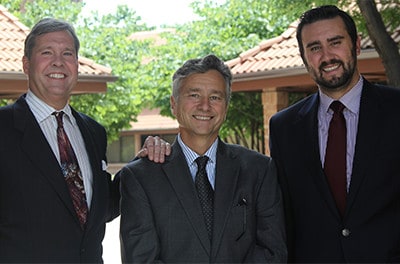Motorcycle accidents are typically much more devastating than automobile accidents, primarily due to the fact that a motorcyclist has none of the protections afforded those inside an automobile, surrounded by steel and glass, not to mention airbags and safety belts.
Consider the following motorcycle accident trauma statistics:
- While about 75 percent of all motorcycle accidents involve an automobile (or other type of vehicle), about a quarter of all motorcycle accidents involve the motorcyclist and either the roadway or a fixed object.
- In motorcycle accidents which do not involve another vehicle, more than two-thirds are caused by motorcyclist error (improper braking, excessive speed and slide-outs, to name a few).
- When motorcyclists are involved in an accident with a vehicle, more than 67 percent of the time, the driver of the vehicle violated the right-of-way of the motorcyclist.
- Those in vehicles often fail to detect a motorcycle in traffic—i.e., they simply do not see the motorcyclist prior to the collision.
- Although the motorcycle collisions which involve deliberate hostile actions by the driver of a vehicle make the news, it is actually a fairly rare cause of motorcycle accidents.
- Excess speed is not necessarily a factor in a significant number of motorcycle accidents—at the time of impact, the average speed of the motorcyclist is 21.5 mph. Only in about one in one-thousand cases is a speed of approximately 86 mph a factor.
- Almost 96 percent of motorcyclists involved in accidents are male, with the majority between the ages of 16 and 24.
- A staggering 92 percent of motorcyclists involved in accidents have no training in riding a motorcycle, rather they are self-taught or learned from a friend or family member.
- Typically, a motorcyclist has less than two seconds to complete collision avoidance actions.
- Motorcyclists are highly likely to sustain serious injury from a motorcycle accident with a vehicle—98 percent of these accidents result in injury to the motorcyclist, with 45 percent resulting in serious injury. The deadliest injuries to motorcycle accident victims are those to the chest and head, and the use of a safety helmet is the single most crucial factor in the prevention or reduction of head injuries among motorcyclists involved in an accident.
Researchers examined data from 26,831 motorcycle accident victims, finding the injury rate for motorcycle crashes—as opposed to crashes involving only vehicles—was three times higher. Severe injuries for motorcyclists were ten times more likely than those involved in car accidents, and motorcycle accident injuries typically cost about twice as much to treat in the two years following the accident.
Deaths are much more common among those who have a motorcycle accident than those who have a vehicle accident—according to the U.S. government, per mile traveled in 2014, the number of deaths on motorcycles was 27 times that of the number of deaths in vehicles. If you have been involved in a motorcycle accident, you may wonder what type of compensation you are entitled to.
Further Reading: The Anatomy of a Car Accident
Damages for Your Motorcycle Accident
Damages for injuries following a motorcycle accident can vary significantly in the amount, depending on a variety of factors. These factors can include whether or not the injuries sustained affected your ability to perform the basic functions of your job as well as the degree of fault between yourself and the other driver. Your damages may also vary according to whether you can be expected to heal relatively quickly from your injuries, or whether they are long term or disabling. Factors to consider when you are attempting to determine your damages are as follows:
- Medical Expenses—Medical expenses for necessary costs associated with your injuries following a motorcycle accident can be staggering. Spinal cord injuries or traumatic brain injuries can require long-term rehabilitative care, even for the duration of the victim’s life.
- Lost Wages—Since motorcycle accidents tend to cause such severe injuries, it is almost a given that a motorcycle accident victim will be off work for at least a period of time and perhaps even permanently. Even the victims who eventually recover—at least partially—may not be able to return to the job they held prior to the accident and could require further training in order to secure a new job.
- Damages to Property—When a motorcycle is hit by a vehicle, not only does the rider suffer devastating injuries the motorcycle itself will likely be severely damaged.
- Compensation for Pain and Suffering—Motorcycle accidents bring emotional trauma on top of the physical injuries. Many people who have been involved in a motorcycle accident may suffer from post-traumatic stress for a long time to come, requiring ongoing counseling.
Motorcycle accidents are both more deadly, and more traumatic than a “typical” automobile accident, therefore it is extremely important that you seek a highly experienced motorcycle attorney following your accident.
Contact Our Experienced North Denver Motorcycle Accident Lawyers
 If you or someone you love has been injured in a motorcycle accident anywhere in Colorado, the steps you take immediately following your crash are more important than you may know. At Hull & Zimmerman, P.C., our committed motorcycle accident lawyers know how to fight aggressively for our motorcycle accident clients – and win. Contact us at (303) 423-1770 or (866) 385-3505.
If you or someone you love has been injured in a motorcycle accident anywhere in Colorado, the steps you take immediately following your crash are more important than you may know. At Hull & Zimmerman, P.C., our committed motorcycle accident lawyers know how to fight aggressively for our motorcycle accident clients – and win. Contact us at (303) 423-1770 or (866) 385-3505.
Our motorcycle accident lawyers have extensive experience representing injured accident victims in Broomfield, Arvada, Superior, Lafayette, Louisville, Erie, Brighton, Commerce City, Northglenn, Westminster, Thornton, Longmont, and throughout Colorado.

